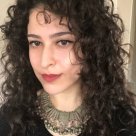Every aspect of society and life has been touched by the COVID-19 pandemic, including writers who are making the most of it by spending more time with their creative muse- no physical distancing needed.

For Reem Fayyad, a Moncton-based poet and full-time working mom, the pandemic has given her the gift of time.
“The lockdown has given me the time to write, read and reflect. It gave me the moment to think about what’s important in life, what we should be grateful for, what we have. It takes you to a deeper level, and when you combine that with time, you get inspired,” said Fayyad.
READ MORE: Montreal writer Kaie Kellough wins $65K Griffin Poetry Prize for ‘Magnetic Equator’
Fayyad, who writes poetry in Arabic, her native language, and English, has been sharing her work on Facebook to connect with other writers and community members as a way to lessen the stress and isolation caused by the pandemic.
“It’s like being in collective crisis where everyone can relate to it. Maybe we are in different boats, but as we say, we’re going through the same storm,” she says.
And according to Fayyad, many are weathering that storm through the use of virtual platforms.
She was recently part of an online event, which promoted the launch of a poetry collection titled ‘Cadence.’ Fayyad was among 19 other women in New Brunswick who contributed to the work.

Get breaking National news
The online event was part of the Frye Festival, which transitioned to online due to COVID-19 in November. It the largest literary event in Atlantic Canada.
“It would have been just kind of a in-person event, but we were basically forced to think outside the box and leveraging the social media platforms,” said Fayyad.
“More connections were established between writers. I’ve met people I’ve never imagined I would I would know about before. You could connect with people in different countries as well, not only within New Brunswick,” she added.
READ MORE: Alberta’s Billy-Ray Belcourt wins $65,000 Griffin Poetry Prize for ‘This Wound is a World’
This new and focused reliance on virtual platforms, such as Facebook and Zoom, has brought on an understanding that a sense of community is everywhere and that support is available for writers, said author and Poet Laureate Kayla Geitzler, who was also the editor for ‘Cadence.’
“The pandemic is proving to be a strange kind of renaissance for writers in Canada,” she said.
“Even though a lot of writers are suffering financially, we’ve been reaching out to each other and to people we don’t even know to try to help them and promote their books.”
She says organizations like the League of Canadian Poets and Poetry In Voice have being really active in trying to show writers that there is a lot of support, with many of their classes and contests moving to online.

As a poet laureate for Moncton and as an editor and consultant, Geitzler has also been offering support by hosting online workshops in poetry, journaling and prose, with new ones to launch in 2021.
But it hasn’t all been butterflies and rainbows.
“I lost many of my clientele, but they started coming back, and I’ve had more people reach out to me. And I think other writers are in that boat, too. A lot of us we’ve been in this for so long that we start to offer our expertise, and so we see that financial lack,” she said.
Despite the challenges, she said the commitment to shed light on the work of established and emerging writers has heightened.
READ MORE:Griffin Poetry Prize to be awarded to Canadian and international poets in Toronto
“I reach out to writers about any opportunities, and the workshops I teach through Zoom I try to offer scholarships and discounts for people to come join that,” said Geitzler.
“Because making them meet other writers or people that are in the same place you are is a really good way to sort of leverage yourself in your own work and create community,” she added.
As Geitzler continues to offer classes and help writers connect with each other, Fayyad said her big next step is to publish her collection of Arabic and English poetry.
“I used to just write in Arabic and translate. Now I find you start to think in the other language as you start to belong and more and more to community, so I’ve been writing more in English,” said Fayyad.
She hopes to bring Arabic and English together in a book to mirror each other’s beauty in the coming future.











Comments